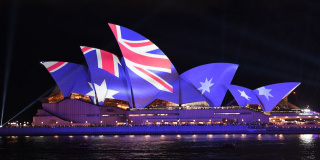Australians have donated $5.1 million to Ukraine after the russian invasion almost four months ago, with a healthcare company offering medical kits for 750 patients.
About 10,000 donors have helped the Ukraine. Crisis Appeal send aid to people in regular deliveries that include medical supplies being flown to Europe and distributed by volunteers inside Ukraine to some of the most devastated parts of the country.
Sydney company Device Technologies added to the tally in the past week by offering 140 kits to hospitals in Ukraine to treat up to 750 patients with severe bone injuries using sterile packs that come with metal plates and screws.
“Australia has to be vigilant to ensure that Ukraine fatigue does not set in because the war continues and people continue to die,” said Stefan Romaniw, the co-chair of the Australian Federation of Ukrainian Organisations.
“At the end of the day, if Ukraine wins, the world wins. If Ukraine loses, we all lose. So we have to keep up the fight.”
The chair of the Medical Aid for Ukraine group that is part of the crisis appeal, Liz Paslawsky, is coordinating a group of civilian volunteers in Australia and Europe who deliver supplies from about 60 donors including hospitals and healthcare companies.
Paslawsky said the Australian donors had contributed medical items worth more than $2 million to date, enough for 200 pallets of deliveries.
The Ukraine Crisis Appeal was set up by the Australian Federation of Ukrainian Organisations, with Rotary Australia and Caritas Ukraine in 2015 and has escalated its activities since the February invasion. Donations are tax-deductible.
Paslawsky said the need for medical supplies was growing because people with chronic disease could not get basic medication in parts of Ukraine, in addition to the help needed for those wounded in the conflict.
“We are forever grateful for the generosity, support and kindness provided by so many individuals and organisations across Australia,” she said.
The federal government has also sent medical supplies, military equipment and 20 Bushmaster armoured vehicles to Ukraine.
“For the first six weeks post-invasion, virtually all humanitarian aid inside Ukraine was organised and implemented by local actors,” said the June report by the United Kingdom Humanitarian Innovation Hub.
Volunteer groups have sprung up across the country, and especially in areas where fighting has caused dislocation and disruption of daily life.
Typically, a small group of friends and associates begins work by pooling its own money and other resources, such as vehicles and relevant know-how, and responds to needs it sees in its immediate community for household and shelter items.
© Times of Ukraine

